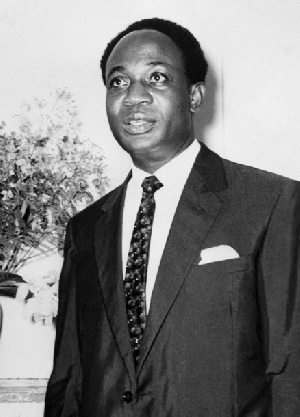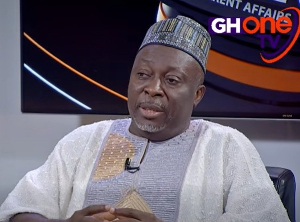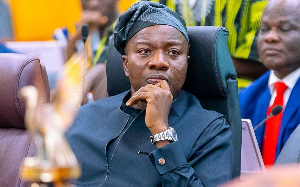By George Sydney Abugri
By a twist of fate and circumstance, it came to pass that the opponents of Ghana's first President, Dr. Kwame Nkrumah, chose the outskirts of my home town Bawku, as the scene for a bomb attack on him.
A friend now deceased once said in pidgin English of the many attempts on the life of Dr. Nkrumah: "They bomb the man! They bomb the man!! They bomb the man tay..y..y..y... !!" The last word meaning "persistently”. To bomb a building or a town may be, but to bomb a man .... !
I remember this Ger¬man medical officer in charge of the Bawku Basel Mission Hos¬pital at the time, who had Dr. Nkrumah on an oper¬ating table soon after the attack. His name was Dr. Haaf. Many people in Bawku today who are above 60 remember him. The townsfolk thought the name was Dr. Half and they called him that.
When I brought up the subject before he died, my father who worked at the Bawku Hospital for more than 35 years and was on duty on that fatefulday, told me how a gunman went to Dr. Haaf’s bungalow after he had operated upon Dr. Nkrumah following the bomb attack, and made an abortive attempt to kill the German doctor! I doubt if these events have been recorded anywhere.
That is why this narrative will make an attempt to give Bawku some national historical identity somehow. This seems necessary for a dis¬trict capital located more than 900 kilometres from the national capital, which has been besieged by thousands of foreigners of indeterminate immigra¬tion status, who have taken up more or less permanent residence for many decades now.
If you go to sleep in Accra and wake up in Bawku you will probably have some difficulty try¬ing to figure out which part of the West African sub-¬region you are in.
Dr. Nkrumah was all for African Unity of course, but he was not so naive as to take border demarca¬tions for granted, knowing what can happen when you neglect to keep an eye on your neighbours”s side of the fence, hence his ill-fated trip to the Upper Volta which nearly cost him his life when he was attacked at Kulugungu near Bawku.
The mention of in¬vading foreigners who have been trooping to Bawku since independence, is not in ref¬erence to Moshies, Hausas, Busangas and others whose ancestors have been in residence in the town for centuries. It is in reference to the thousands of Fulanis, Zabramas and others who have been pouring nonstop into Bawku for decades and who have taken permanent residence at Posom, Gingande, Sabon Zongo, Daduri, Azanga and other suburbs of Bawku.
Since independence to date, se¬vere environmental and ecological conditions in the Sahel have kept driving aliens into Bawku .Today, how many non-Ghanaians are resident in Bawku? How many of them are legal immigrants? What are their countries of origin? How many aliens have acquired land in Bawku during the period and for what purposes? I doubt if the government knows.
Answers to these and other questions have be¬come necessary. Neces¬sary for state security, nec-essary for environmental management and neces¬sary for planning the de¬velopment of the town. Waste disposal facilities are too limited to cope with the needs of Bawku s large population and sanitation is poor in many parts.
Today, the population density of Bawku is 169 persons per square kilometer, which is much greater than the average national population density of 103 persons per square kilometer.
If being the farthest district capital from the national capital is a mis¬fortune, this district capital's closeness to Ghana's borders with Togo and Burkina Faso has been for some towns folks a blessing too.
For many in the densely populated town, "private business" was synonymous with smuggling for decades: While the long defunct border guards of the Ghana Army and later the Customs, Excise and Preventive Service waited dutifully at the bor¬der post at Misiga to col¬lect duties and other taxes on imports, smugglers slipped through numerous unapproved routes into or out of town.
For many of them, con¬cealing goods in luggage or offering bribes to cus¬toms officials to get through with contraband was not the right style.
The right style was to go charging through very narrow bush paths at breakneck speed on the popular, versatile, made-in-France "Peugoet Mobilettes", with a load of contraband so huge, both rider and mobilette cold barely be seen.
They smuggled out cola-nuts, salt, petroleum products and timber, and smuggled in whisky, ciga-rettes, wax print, shoes and other goods. When I was a tutor at the Bawku Technical Institute in the 1970s, you could slip out to Sankasi on the border with Togo and buy a bottle of "White Horse" whisky at less than a quarter of the price it sold in Ghana.
The average cigarette vendor in Bawku was unlikely to offer a smoker locally manufactured cigarettes from the nation’s premier manufacturer and distributor, the Pioneer Tobacco Company {PTC}. The most popular brands on offer by vendors were St Moritz, Pall Mall and Benson and Hedges.
The heavy population density in Bawku Central becomes apparent on a market day. On a typical market day hundreds of unfriendly people could slip into the town from across the border, without the local security agencies being any the wiser; unless of course the visitors came dressed in red shirts red shorts, red caps red shoes and singing “Here we come”, in Key "G" major.
You can slip into and out of Ghana unnoticed through Sankasi, Werikambo Mognori, Kulugungu, the "Dapango Trail” and many other en¬try and exit points at Bawku.
In the early 1950s and 1960s "Congo Station" at the main Bawku Station was a place many residents avoided. It was the enclave of muscular, hard-living, often bare chested young men who gambled at the "Chacha" tables, swore loudly and engaged in bloody fist-fights all day.
In the 1970s they were replaced by a more sophis¬ticated breed of young people who wore bell-bot¬tom trousers and went by names like Dan Vadis, London, Man Ciscoj Tommy Dollars and Zingaro.
Congo Station is still there, but many people do not seem to remember it by that name and the more sophisticated youth of today do not hang out there. During my last visit years ago, some people whispered into my ear that in today's Bawku, at least one out of every ten young men goes around armed with a pis¬tol and it is necessary to be careful. Where do they get them from? "An unknown but apparently cheap source" says one resident.
Opinions of Tuesday, 27 September 2016
Columnist: Abugri, George Sydney















